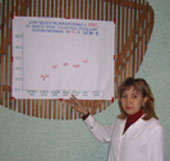
Motivating Providers by Posting
Performance Data
“In our routine work we sometimes forget to talk with clients about sexually transmitted infections. The public postings remind us to include these messages when we are engaged with our patients.”
For N. Kim, an ob/gyn in Bishkek, Kyrgyzstan, the posting of data on her performance in the family medicine center where she works has served as an incentive to include information about sexually transmitted infections (STIs) when providing family planning counseling and services.
Kim and 93 other providers are participating in a pilot conducted by the PRIME II Project to test the effectiveness of public posting as a motivating tool for primary care providers to improve their performance in family planning and reproductive health care.
Performance needs assessments by PRIME in 18 countries have confirmed that improving primary-level service delivery depends on more than just training programs to strengthen providers’ knowledge and skills. Factors such as motivation to perform to standard, clear job expectations, timely performance feedback, and adequate environment and tools may also need to be addressed to solve performance problems.
While often identified as an important missing factor, motivation presents particular challenges in low-resource settings where providers are poorly paid and bonuses and other tangible rewards are not an option. Indeed, often there are strong disincentives for providers to meet performance standards. PRIME selected public posting for the pilot in Kyrgyzstan because it has proven to be a low-cost, sustainable method of motivating employees in developed country contexts. Since information on STIs is frequently omitted during family planning visits, PRIME chose this element of provider performance as the dependent variable for the study.
In 28 family medicine centers and clinics in Bishkek, data on provider performance are collected through exit interviews with family planning clients and posted every five weeks or so in areas of the facilities where only the providers can see them. The percentage of clients reporting STI prevention counseling during family planning visits rose steadily during the first three postings, from 33% to 46%, before dropping to 37.5% at the fourth posting. Performance increased to 53% for the fifth posting and to 56% for the sixth, gains PRIME attributes to the swift reaction of clinic supervisors to the fourth posting results. More than 2,400 clients have been interviewed for the study.
To validate the findings of the client interviews, PRIME is observing a sample of providers as they deliver family planning counseling to interviewed clients. The pilot also employs in-depth interviews and focus group discussions with providers and supervisors to track changes in provider motivation.
The focus groups have shown that public posting is inspiring providers with high scores to sustain their performance as well as motivating those who need more improvement. “Because I am doing a good job, the postings have been pleasant for me,” noted one ob/gyn. “I am glad to see that my patients know the answers to the questions about STIs.”
Supervisors are encouraged by the results and plan to continue the postings after the PRIME pilot ends. “Public posting is clearly very effective and informative,” attests L. Kachibekova of Family Medicine Center No. 5. “The method is also inexpensive. We can continue it and we have already begun to think how we can expand this to other areas with limited additional resources.”
The PRIME II Project, funded by USAID and implemented by IntraHealth International and the PRIME partners, works around the world to strengthen the performance of primary providers as they strive to improve family planning and reproductive health services in their communities.
PRIME Voices #29, Kyrgyzstan: Motivating Providers by Posting Performance Data, 4/21/04.
|











